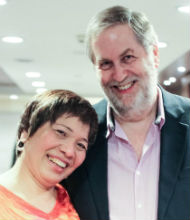SUMMARY
This is AI generated summarization, which may have errors. For context, always refer to the full article.
 Rappler’s Life and Style section runs an advice column by couple Jeremy Baer and clinical psychologist Dr Margarita Holmes.
Rappler’s Life and Style section runs an advice column by couple Jeremy Baer and clinical psychologist Dr Margarita Holmes.
Jeremy has a master’s degree in law from Oxford University. A banker of 37 years who worked in 3 continents, he has been training with Dr Holmes for the last 10 years as co-lecturer and, occasionally, as co-therapist, especially with clients whose financial concerns intrude into their daily lives.
Together, they have written two books: Love Triangles: Understanding the Macho-Mistress Mentality and Imported Love: Filipino-Foreign Liaisons.
Dear Dr Holmes and Mr Baer,
My husband and I have been together for 7 years, two years as a married couple. He is everything a woman could ever ask for – loving husband and father, prioritizes his family, and provides for our child and his needs. I shouldn’t be seeking help on this for some might say my concern is too petty, but I still feel disappointed that he does not celebrate occasions that call for celebrations.
It started on my birthday last year. Thought we would go out for dinner but he came home late and said that it’s just a birthday and I could just let it pass. I felt disappointed and did not talk to him about how I felt.
Come last quarter of 2015. I passed my licensure examination and was thinking we could probably celebrate but then still, he opted to stay home and eat dinner there. Again, I was disappointed so this time, I asked him how come we do not celebrate occasions like these. His response was, “birthdays, anniversaries, getting awards… these are just ordinary situations.”
Yesterday was our second wedding anniversary; he just came from a month-long US trip a day before that (so probably he was still tired? Maybe he was jetlagged?), and again, we did not make any sort of celebration. He came home tired, greeted and kissed me, ate dinner, then immediately fell asleep. I was awake the entire night thinking something was missing.
I love my husband so dearly but this is something. Is it just me, or he needs to take an extra effort making me feel I’m exceptionally loved on some days?
Oh by the way, the morning after our anniversary, he cooked breakfast and seriously had no idea why I wasn’t talking to him. When I mentioned about our wedding anniversary, he replied “but it feels like our anniversary every day.”
Thanks!
Maria
——————-
Dear Maria,
Thank you for your email.
According to your account your problem with your husband (let’s call him Mario) centers on the celebration of anniversaries and the like. You feel aggrieved at his cavalier attitude and it rankles. However, I wonder whether this is just the tip of the iceberg and below the surface other more fundamental issues are in play.
The first question that springs to mind is: what caused Mario’s attitude to celebrations to change last year? Presumably he was happy to celebrate for the first 5-6 years of your relationship, so what happened? More to the point, perhaps, have you actually explored this with him or is your standard response more of the silent tampo variety?
This leads on to what this relatively minor issue reveals about your entire relationship with Mario. How is it that a man who “is everything a woman could ever ask for” simply dismisses his wife’s desire to celebrate significant milestones in their joint lives in such a summary and perfunctory way, and how is it that his wife seemingly just accepts his unilateral decision? And what does this all say about their overall relationship?
Any relationship, whether it leads to marriage or not, requires adjustment and compromise. How to live one’s life when one is single is decided by the individual in question; how to live one’s life when one is attached, however loosely, is (or should be) more of a joint decision. This extends to whatever facets of the two lives in question are important and this obviously varies from couple to couple.
It sounds as though you need to start a proper conversation with Mario and discuss 1) the initial issue of celebrations and 2) how you can both adjust to each other across the board. This may seem an enormous task but if you take it one step at a time, success will become much more achievable. Best of luck.
JAF Baer

Dear Maria:
Thank you very much for your letter. Thank you too, Mr Baer, for sharing how something so seemingly insignificant can actually be the exact opposite. In my opinion, Mr Baer has brought up all the important points you need to look at in your relationship, thus allowing me to focus on one of my favorite techniques when dealing with people who feel their relationships are basically ok, but need some fine-tuning.
I call this a technique because that is exactly what it is: a way to discuss/communicate your needs with your spouse that may make it easier for him to understand your needs better.
However, a technique works only if the other person is willing to first, listen and then, try to make his spouse happy/content. Otherwise, it will be useless.
I am speaking specifically of the languages of love, introduced to the world by Dr Gary Chapman, who wrote The Five Love Languages: How to Express Heartfelt Commitment to Your Mate in 1992.
Since then a wide variety of “love language books” have been written by Dr Chapman, the latest two published in April 2016:
- The 5 Love Languages of Children: The Secret to Loving Children Effectively (with Ross Campbell as co-author)
- The 5 Love Languages of Teenagers: The Secret to Loving Teens Effectively
Dr Chapman believes that people give and receive love as expressed through one of five languages: words of affirmation, quality time, receiving gifts, acts of service, or physical touch.
He argues that, while each of these languages is enjoyed by a person, one would usually speak one primary and (perhaps) one secondary love language.
In other words, if you want to your husband to celebrate important days with you, perhaps expressing it in terms of love languages will do the trick.
The first thing you have to do is discover if you speak the same primary love language because your language may be as different from your spouse’s as “English from Chinese.”
To discover your own primary love language, ask yourself these 3 questions:
- How you most often express love to others: e.g. if you are consistently, verbally affirming people, then Words of Affirmation is likely your love language.
- What you complain about most often: e.g. when you say to your spouse, “I don’t think you would ever touch me if I did not initiate it,” you are revealing that Physical Touch is your love language.
- What you request of your spouse most often: e.g. “Do you think we could get a weekend away this month?” is a request for Quality Time. “Would it be possible for you to drive me to the beauty parlor later?” expresses your desire for Acts of Service. (Your answer to these three questions will likely reveal your primary love language.)
Mr Baer suggests you “start a proper conversation with Mario and discuss 1) the initial issue of celebrations and 2) how you can both adjust to each other across the board.”
He recognizes that “This may seem an enormous task” and that is the reason I feel broaching the subject in terms of love languages may make it easier.
I am fairly certain your husband Mario can relate to the 5 languages because of his responses when you tried to discuss this matter twice before:
- When he explained that “birthdays, anniversaries, getting awards… these are just ordinary situations” (and thus no cause of celebration); and
- When he replied “but it feels like our anniversary every day” (and thus no need to celebrate your actual wedding anniversary)
But the above are his views, not yours. The beauty of this concept (or technique) is that there is no need to convince him that your view is better, or wiser, more practical, more efficient, more romantic, etc.
In like manner, there is no need for him to trivialize your desire to celebrate what to you are important occasions.
Through the prism of the languages of love, we realize that each of us has his/her preferred love language and there is no need to justify why yours is what it is, or his is what his is. What is important is that we recognize, understand, and accept what our own and spouse’s primary (and, perhaps, secondary) love langages are.
If there is true love between you, wanting to respond in preferred kind will not be a problem. If, however, true love is non-existent, I guess celebrating will be the least important item on your agenda – at least for the time being. Good luck.
MG Holmes
Need advice from our Two Pronged duo? Email twopronged@rappler.com with subject heading TWO PRONGED.Unfortunately the volume of correspondence precludes a personal response.
Add a comment
How does this make you feel?
There are no comments yet. Add your comment to start the conversation.